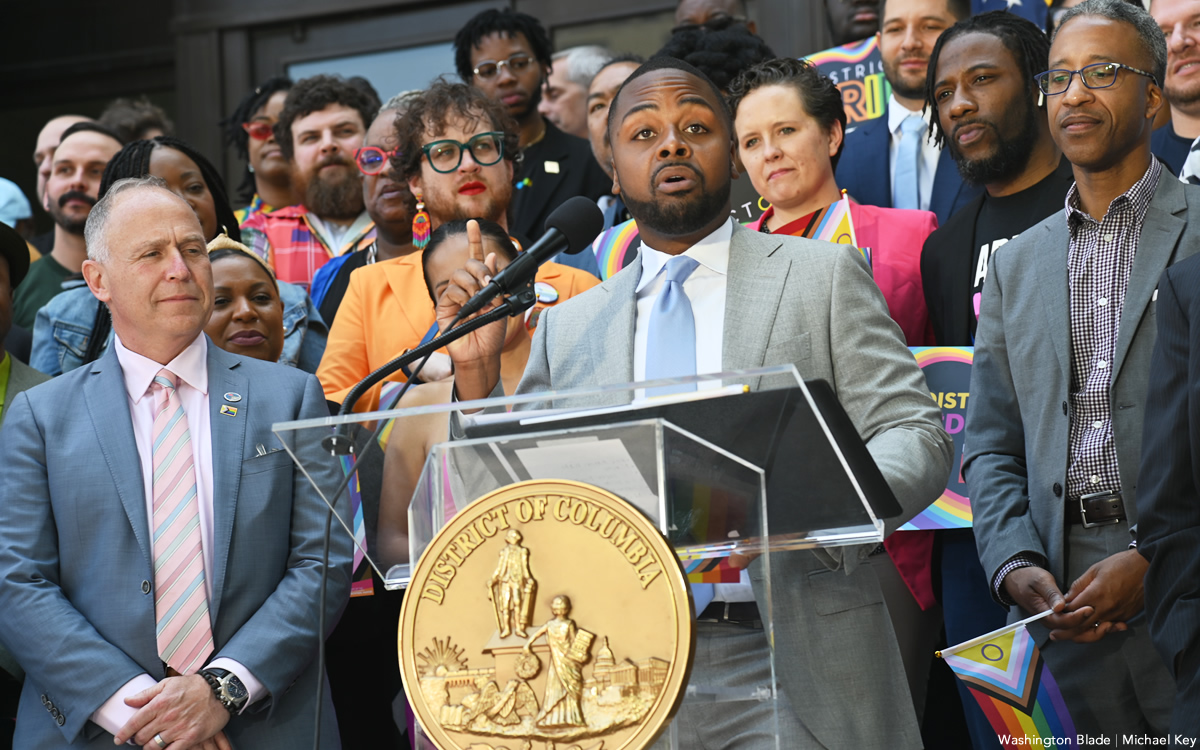Local
D.C. files Supreme Court brief defending marriage

D.C. Attorney General Peter Nickles and other city attorneys have urged the U.S. Supreme Court not to take a case filed by a local minister seeking to overturn the city’s same-sex marriage law.
In a 35-page legal brief filed Dec. 17, the city attorneys argue that the D.C. Court of Appeals ruled correctly earlier this year that the District has authority to prohibit a voter initiative or referendum seeking to overturn the Religious Freedom and Marriage Equality Amendment Act of 2009.
“This case is not important enough to merit review” by the Supreme Court because it “lacks national importance as it is confined in effect to the District,” Nickles and the other attorneys said in their brief.
The case, known as Jackson v. the D.C. Board of Elections and Ethics, was initiated by Bishop Harry Jackson and other local opponents of same-sex marriage earlier this year.
The city filed its brief on the last day such a brief could be filed under Supreme Court rules.
Jackson and his allies are seeking to overturn separate rulings by the city’s election board and the D.C. Superior Court and Court of Appeals that the District’s initiative and referendum law doesn’t allow ballot measures that would have the effect of violating the city’s Human Rights Act. The act, among other things, bans discrimination based on sexual orientation.
Most legal observers say the Supreme Court traditionally defers to state appeals courts –- including the D.C. Court of Appeals — in matters that don’t have national implications. The observers, including local gay rights attorney Mark Levine, have said the high court would be violating its own precedent and possibly showing a sign of bias against same-sex marriage should it rule in favor of Jackson’s petition.
The city’s brief also seeks to refute a claim by Jackson’s attorneys that the Supreme Court can take on a case without national significance if the lower court ruling is reached through an “egregious error.”
“In fact, the appeals court decision is correct” and the “egregious error” argument doesn’t apply, Nickles and his team of city lawyers argue in the brief.
Jackson’s petition to the high court, known as a Petition for a Writ of Certiorari,” calls for the court to take on the case and involves a decision by the nine justices to accept or reject that request. Should they accept the case, the justices would then review it on its merits through oral and written arguments and issue a separate ruling.
Arthur Spitzer, legal director of the ACLU’s D.C. area office, said the Supreme Court is likely to decide whether to accept or reject the Jackson case in January.
Maryland
What Anne Arundel County school board candidates think about book bans
State lawmakers passed Freedom to Read Act in April

BY ROYALE BONDS | Parents’ efforts to restrict content available to students in school libraries has become a contentious issue in Maryland. Conservative parent groups, such as Moms for Liberty, have been working to get books they believe are inappropriate removed from libraries in Carroll and Howard counties, sparking protests, new policies, and even a state law.
The Freedom to Read Act, passed in April, sets standards that books cannot be removed from public and school libraries due to an author’s background. Library staff that uphold the standard are protected under this act. The law, however, does not prohibit removing books deemed “sexually explicit,” the stated reason local Moms for Liberty chapters challenged school library books.
The rest of this article can be read on the Baltimore Banner website.
District of Columbia
D.C. Council member proposes change for Mayor’s Office of LGBTQ Affairs
Parker also seeks increased funding for LGBTQ programs in FY 2025 budget

D.C. Council member Zachary Parker (D-Ward 5), the Council’s only LGBTQ member, has asked his fellow Council members to support a proposal to change the Mayor’s Office of LGBTQ Affairs to become a “stand-alone entity outside the Executive Office of the Mayor to allow for greater transparency and accountability that reflects its evolution over the years.”
In an April 30 letter to each of his 12 fellow Council members, Parker said he plans to introduce an amendment to the city’s Fiscal Year 2025 Budget Support Act to make this change for the LGBTQ Affairs Office.
His letter also calls for adding to the city’s FY 2025 budget two specific funding proposals that local LGBTQ activists submitted to D.C. Mayor Muriel Bowser that the mayor did not include in her budget proposal submitted to the Council. One calls for $1.5 million to fund the completion of the build out and renovation for the D.C. Center for the LGBTQ Community’s new building in the city’s Shaw neighborhood and $300,000 in subsequent years to support the LGBTQ Center’s operations.
Parker’s second budget proposal calls for what he said was about $450,000 to fund 20 additional dedicated LGBTQ housing vouchers as part of the city’s existing program to provide emergency housing support for LGBTQ residents and other residents facing homelessness.
“The Office of LGBTQ+ Affairs currently manages about 90 vouchers across various programs and needs,” Parker said in his letter to fellow Council members. “Adding an additional 20 vouchers will cost roughly $450,000,” he wrote, adding that dedicated vouchers “play a crucial role in ensuring LGBTQ+ residents of the District can navigate the complex process of securing housing placements.”
In her proposed FY ’25 budget, Bowser calls for a 7.6 percent increase in funding for the Office of LGBTQ Affairs, which amounts to an increase of $132,000, bringing the office’s total funding to $1.7 million.
“To be clear, I support the strong work and current leadership of the Office of LGBTQ+ Affairs,” Parker says in his letter to fellow Council members. “This push for change is in recognition of the office’s notable achievements and the significant demands being placed on it, which require a greater level of accountability.”
Parker told the Blade in an April 30 telephone interview that he believes Japer Bowles, the current director of the Office of L|GBTQ Affairs is doing an excellent job in operating the office, but he believes the office would be able to do more for the LGBTQ community under the change he is proposing.
“Making it a stand-alone office versus it being clustered within the Community Affairs division of the mayor’s office, it will get more attention,” Parker told the Blade. “The leadership will have greater flexibility to advocate for the interest of LGBTQ residents, And we will be able to conduct greater oversight of the office,” he said, referring to the Council’s oversight process.
Parker noted that other community constituent offices in the mayor’s office, including the Office of Latino Affairs and the Office of Veterans Affairs are stand-alone offices that he hopes to bring about for the LGBTQ Affairs Office. He said Council member Brianne Nadeau, who chairs the Council committee that has oversight for the LGBTQ Affairs Office, has expressed support for his proposal.
Also expressing support for Parker’s proposal to make the LGBTQ Affairs Office a stand-alone office is the D.C. Advisory Neighborhood Commission Rainbow Caucus. Vincent Slatt, the caucus’s chairperson, submitted testimony last week before the D.C. Council Committee on Public Works and Operations, which is chaired by Nadeau, calling for making the LGBTQ Affairs Office a stand-alone office outside the Executive Office of the Mayor.
Slatt also stated in his testimony that the office has a “chronic staffing shortage” and recommended that at least three additional staff members be assigned to the office.
Daniel Gleick, the mayor’s press secretary, told the Blade the mayor’s office is reviewing Parker’s budget proposals, including the proposed change for the Office of LGBTQ Affairs.
But in testimony at a May 1, D.C. Council budget hearing before the Council’s Committee on Executive Administration and Labor, Lindsey Parker, Mayor Bowser’s Chief of Staff, appeared to express skepticism over making the LGBTQ Affairs office a stand-alone office. Lindsey Parker expressed her thoughts on the proposed change when asked about it by Councilmember Anita Bonds (D-At-Large), who chairs the committee that held the hearing.
“I would proffer that it doesn’t matter whether the agency is within the EOM [Executive Office of the Mayor] or not,” Lindsey Parker told Bonds. “They will still be reporting up into one would argue the most important agency in the D.C. government, which is the one that supports the mayor,” Lindsey Parker said. “So, it’s the closest to the mayor that you can get,” she said “So, you could pull it out and have a different budget chapter. I actually think that’s confusing and convoluted.”
Lindsey Parker added, “The Mayor’s Office of LGBTQ Affairs, with their six FTEs right now, if they were a stand-alone function they wouldn’t have all the non-personnel services in order to operate. They need to be under sort of the shop of the EOM in order to get those resources.”
By FETs Lindsey Parker was referring to the term Full Time Equivalent employees.
Rehoboth Beach
Former CAMP Rehoboth official sentenced to nine months in prison
Salvator Seeley pleaded guilty to felony theft charge for embezzlement

Salvator “Sal” Seeley, who served as an official with the Rehoboth Beach, Del., CAMP Rehoboth LGBTQ community center for 20 years, was sentenced on April 5 by a Sussex County Superior Court judge to nine months in prison and to pay $176,000 in restitution to the organization.
The sentencing took place about five weeks after Seeley pleaded guilty to a charge of Theft in Excess of $50,000 for allegedly embezzling funds from CAMP Rehoboth, a spokesperson for the Delaware Department of Justice told the Washington Blade.
Seeley’s guilty plea came shortly after a grand jury, at the request of prosecutors, indicted him on the felony theft charge following an investigation that found he had embezzled at least $176,000 from the nonprofit LGBTQ organization.
“Salvatore C. Seeley, between the 27th day of February 2019 and the 7th day of September 2021, in the County of Sussex, State of Delaware, did take property belonging to CAMP Rehoboth, Inc., consisting of United States currency and other miscellaneous property valued at more than $50,000, intending to appropriate the same,” the indictment states.
“The State recommended a sentence of two years of incarceration based on the large-scale theft and the impact to the non-profit organization,” Delaware Department of Justice spokesperson Caroline Harrison told the Blade in a statement.
“The defense cited Seeley’s lack of a record and gambling addiction in arguing for a probationary sentence,” the statement says. “Seeley was sentenced in Superior Court to a nine-month prison term and to pay a total of $176,000 in restitution for the stolen funds,” Harrison says in the statement.
Neither Seeley nor his attorney could immediately be reached for comment.
At the time of Seeley’s indictment in February, CAMP Rehoboth released a statement saying it first discovered “financial irregularities” within the organization on Sept. 7, 2021, “and took immediate action and notified state authorities.” The statement says this resulted in the investigation of Seeley by the state Department of Justice as well as an internal investigation by CAMP Rehoboth to review its “financial control policies” that led to an updating of those policies.
“As we have communicated from day one, CAMP Rehoboth has fully cooperated with law enforcement,” the statement continues. “At its request, we did not speak publicly about the investigation while it was ongoing for fear it would jeopardize its integrity,” according to the statement. “This was extremely difficult given our commitment to transparency with the community about day-to-day operations during the recent leadership transition.”
The statement was referring to Kim Leisey, who began her job as CAMP Rehoboth’s new executive director in July of 2023, while the Seeley investigation had yet to be completed, following the organization’s process of searching for a new director. It says Seeley left his job as Health and Wellness Director of CAMP Rehoboth in September of 2021 after working for the organization for more than 20 years.
“Mr. Seeley’s actions are a deep betrayal to not only CAMP Rehoboth but also the entire community we serve,” the statement says.


















